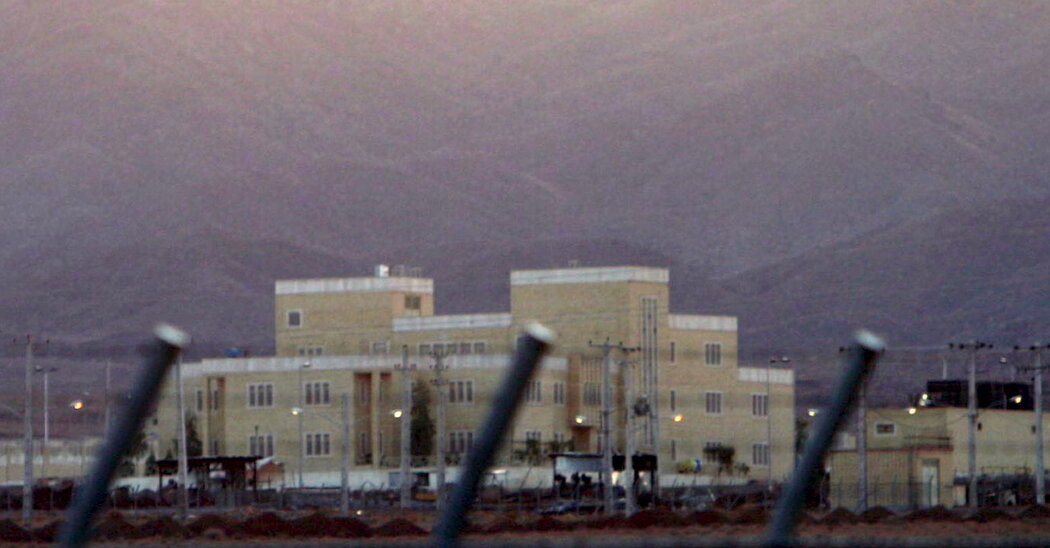The United Nations’ nuclear watchdog agency on Wednesday censured Iran over its refusal to grant inspectors access to its uranium enrichment program, passing a carefully worded resolution after the United States toned it down in a bid to avoid provoking a crisis at a time in which the Middle East is already roiling.
The resolution was sponsored by France, Britain and Germany in response to advances in Iran’s nuclear program over the past year and the Iranian’s government’s refusal to cooperate with the agency. By most estimates Tehran is now just days or weeks away from being able to produce bomb-grade fuel for roughly three nuclear weapons, though actually fashioning them into warheads could take a year or more.
The resolution passed in a vote of the 35-member board of the International Atomic Energy Agency, a United Nations body, with 20 votes in favor, 12 abstentions and two against. The no votes were cast by Russia and China. Russia has close security ties to Iran and purchases Iranian drones for the war in Ukraine. China is a close economic ally helping Iran evade sanctions by purchasing its oil at a discounted rate.
Nine years ago, when Iran agreed to sharp limits on its nuclear program in a deal reached with the Obama administration and European nations, both Russia and China joined the effort to contain Tehran’s nuclear capabilities. The vote in Vienna on Wednesday made clear how dramatically their position has shifted.
While I.A.E.A. censure resolutions are not legally binding, they do carry political weight. In November 2022, the board passed a similar resolution that was drafted by the same three European countries, demanding that Iran cooperate with investigations into uranium traces found at suspected former nuclear sites. Iran never complied.
The Biden administration, though, was clearly concerned about avoiding a resolution that was so sharply worded that it could set off a backlash in Tehran. American officials said that they shared the Europeans’ concern, but that they did not want to back an unenforceable resolution that might prompt Iran to escalate its nuclear program at a time it is seeking to defuse tensions in the region.
In the end, after some modifications of the wording, the United States voted for the resolution.
Iran has long maintained that its nuclear program is for peaceful purposes and that it is not pursuing a bomb. But in recent months, several senior officials have said publicly that Iran could revise its nuclear doctrine if it faced an existential threat from other nuclear countries, namely Israel and the United States.
Ali Vaez, the Iran director of the International Crisis Group, said that as a matter of principle the resolution adopted on Wednesday was merited, given the longstanding concerns about Iran’s lack of cooperation with the U.N. agency, but that it might backfire. “Precedent suggests that Tehran is more likely than not to double down on the very actions that are being condemned,” Mr. Vaez said.
Even before the votes were cast, Iran was signaling its displeasure. On Tuesday, the president of Iran’s Atomic Energy Organization, Mohammad Eslami, called the resolution “anti-Iranian” and politically motivated and pledged immediate retaliation, according to the Iranian media.
It was not immediately clear what steps Iran might take, but its options include increasing still further the level of its enriched uranium, which is now at 60 percent, just short of the 90 percent that is usually considered weapons-grade fuel. That is far higher than the enrichment levels, normally around 3 percent, needed to produce fuel for nuclear power.
On Wednesday, Iran’s interim foreign minister, Ali Bagheri Kani, who has also served as the chief nuclear negotiator, said his government could “activate” its nuclear capabilities based on its national interests, according to a video of his comments on Iranian media.
The vote came only two weeks after the death of Iran’s president and foreign minister in a helicopter crash.
Iran and seven allies — Russia, China, Belarus, Zimbabwe, Venezuela, Nicaragua and Syria — issued a joint statement condemning the I.A.E.A. censure. They called the resolution ill-conceived and said it violated diplomatic norms, given that Iran is still mourning the deaths of its president and foreign minister. The statement said the resolution would have “the opposite effect.”
The three-page resolution lays out a long list of concerns about the Iranian nuclear program, particularly the unanswered questions about why traces of uranium were found in two locations that Iran had not declared as part of its nuclear program. It calls on Iran to allow inspectors to take samples, and it asks that the government lift a prohibition on the agency’s top investors examining the sites they need to see inside Iran.
When the Biden administration first came to office, it attempted to negotiate what Secretary of State Antony J. Blinken referred to as a “longer and stronger” version of the nuclear deal reached in 2015. The agreement fell apart after President Donald J. Trump unilaterally exited from it in 2018 and imposed tough economic sanctions on Iran. Experts — among them Mr. Trump’s own advisers — had told him that the deal was largely working.
A new agreement never came together.
